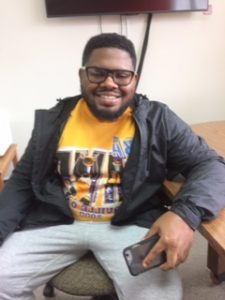

February may have seemed like just another month on the calendar, but for many, it holds a lot of resonance because this month is Black History Month.
February is a time for African-Americans to celebrate who they are, where they are from and what they are today.
Here at Maryville, Black History Month is a month to commemorate what diversity means to our campus.
Austin Davis, president of Maryville’s Association of Black Collegiates (ABC) and a third-year communication major, said that to him, Black History Month is a time to reflect and appreciate “how the people that came before you impacted the way that we do things and the way we can impact others for the people in the future.”
Turan Mullins, assistant dean and director for the Office of Diversity and Inclusion at Maryville, said that for him, the month is “a time to have some intentionality and reflection on the history and the current state of black culture, particularly in America, but I like to look at it globally sometimes.”
For Davis, Black History Month carries relevance in today’s world. He said that as the world gets more diverse and inclusion becomes more common, Black History Month has always stood as a commemoration of a group that has been able to not be “silenced.” The month reminds everyone, he said, that in typical textbooks, people of color are deemphasized, but that “we’re more than just slavery. There is a lot of people that have done great things for America.” He pointed out that because of Black History Month, “we can recognize” the great figures in African-Americans’ past.
For Mullins, Black History Month is relevant “because of the importance of celebrating all cultures.” He added it is very important to know your history.
Davis said in addition to figures like Martin Luther King, Jr., whom he called the “grand figure” of Black History Month, Oprah Winfrey and former President Obama, a black figure from history that stands out to him is Black History Month’s creator, Carter G. Woodson. Woodson turned what began as a week commemorating African-American history into the month-long celebration that it has since become. Davis said, “If it wasn’t for him to say that we deserve a Negro History week, there would be no Black History Month for us to celebrate.”
Mullins, for his part, said, to him, both King and Malcolm X stand out, as they were able to organize effectively and have conversations on race and socioeconomic status in an era before modern technology and with limited resources.
For those seeking to understand black history, Davis recommended those who are interested should do their research on the topic. For example, Googling important black figures, tragedies that affected the African-American community and the systems that still impact today’s world would all count as research.
He also noted ABC does a lot of work making sure that African-American history is remembered, so for Maryville students, he said he would recommend attending an event or meeting, which “would mean a lot to show that you’re trying to learn something that’s kind of close to you.”
Mullins concurred, saying that reading and visiting museums are additional ways to learn about black culture. In short, he noted, “there are a lot of opportunities” for people to learn.
To learn more about ABC, follow them on Twitter and Instagram @abc_musaints.
